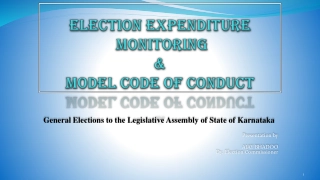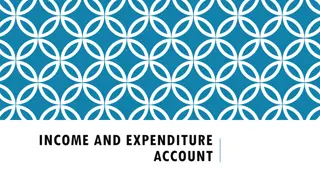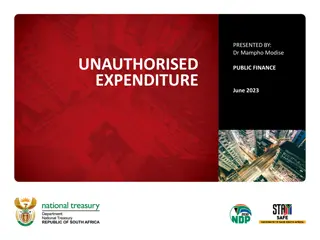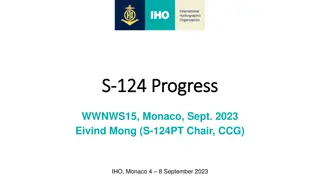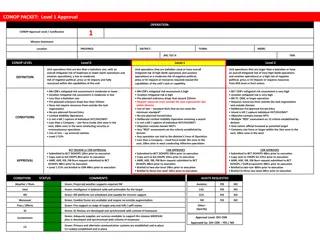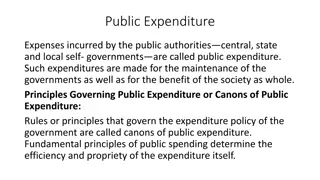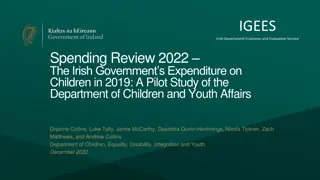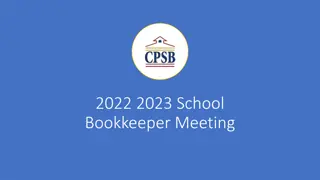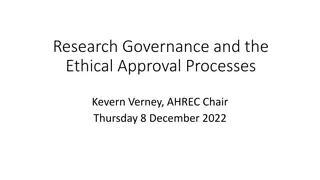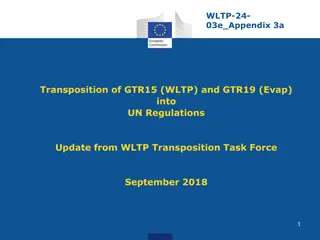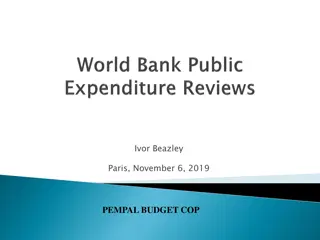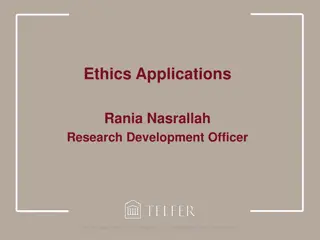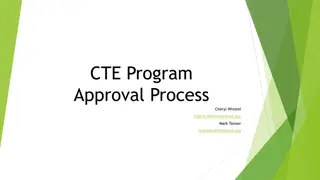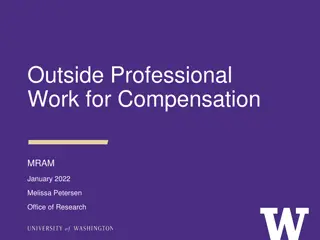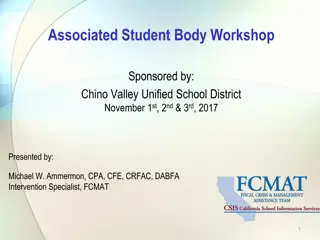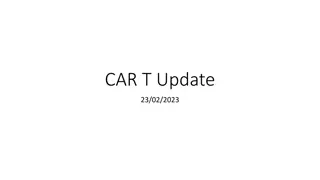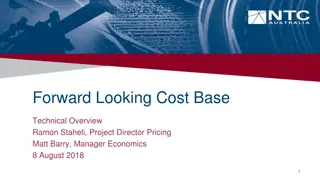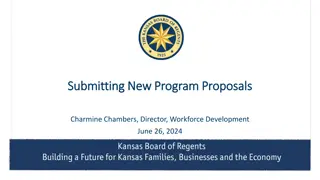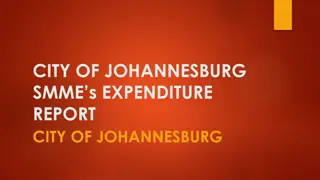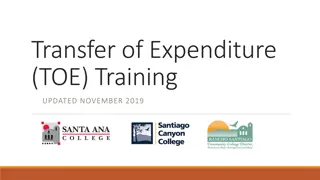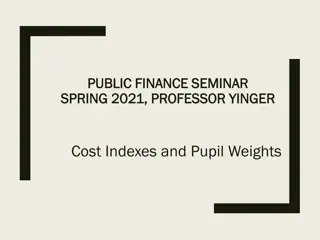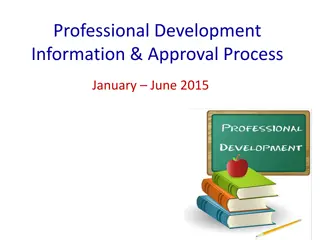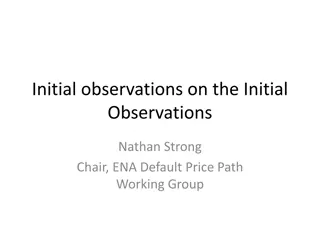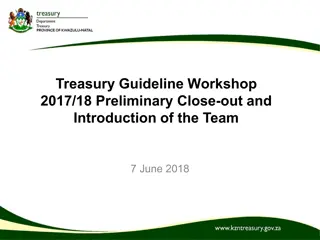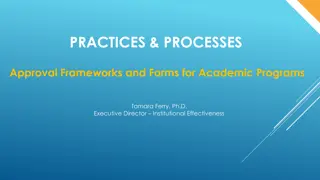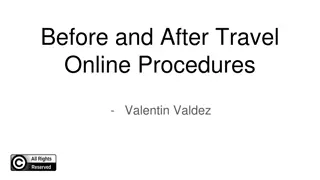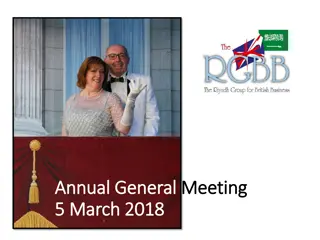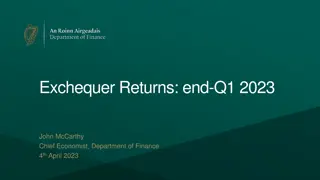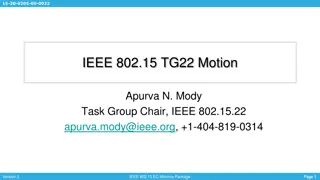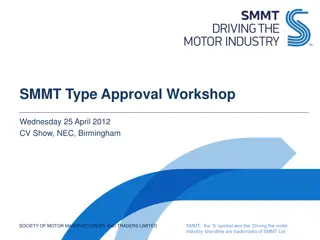Insights on Election Expenditure Monitoring in Indian State Assemblies
This presentation by Ajay Bhadoo, Deputy Election Commissioner, delves into the significance and regulations surrounding election expenditure monitoring in states like Mizoram, Telangana, Chhattisgarh, Rajasthan, and Madhya Pradesh. It covers the impact of money power, legal provisions, types of ele
0 views • 56 slides
Election Expenditure Monitoring in Karnataka State Legislative Assembly Elections
Presentation on the impact of money power in elections, the objective of election expenditure monitoring, legal provisions, machinery involved, role of expenditure observers, and focus areas for monitoring. Details on cases of rescinding elections due to detected money use, types of election expendi
0 views • 59 slides
Research at Hughes Spalding. Updated Review and Approval Process
Navigate the research review and approval process efficiently as a busy clinician investigator at Hughes Spalding with insights on key responsibilities, approval levels, and contact information of relevant personnel. From pre-award tasks like facilitating reviews and gaining approvals to post-award
3 views • 6 slides
Briefing to the Standing Committee on Appropriations on Adjustments Appropriation Bill
The presentation by Ms. Funani Matlatsi, DDG: CFO District Development Model, covers the adjustments in the national expenditure outcome, rationale for unallocated funds, impact on LGES, financial performance of the Municipal Infrastructure Grant, measures to mitigate fund stopping, steps to settle
3 views • 37 slides
Contrasting Public Finance and Private Finance
Public finance involves the income and expenditure of governmental bodies, focusing on societal welfare, compulsory nature, coercive revenue collection, and long-term welfare objectives. In contrast, private finance pertains to individual financial operations, voluntary nature, income adjustments to
9 views • 42 slides
Types of Business Expenditure and Capital Expenditure Explained
Learn about the different types of expenditure in business, including capital expenditure on non-current assets like tangible and intangible items, and revenue expenditure for day-to-day trading activities. Explore examples such as machinery, goodwill, patents, trademarks, and more. Understand the d
3 views • 11 slides
Income and Expenditure Account in Accounting
Income and Expenditure Account, similar to the Profit and Loss Account, records revenue items on the credit side and expenses on the debit side. It follows the accrual concept and reflects only the current period's incomes and expenses. Surplus or deficit is shown based on the excess of income over
0 views • 4 slides
Unauthorised Expenditure in Public Finance Management
The presentation by Dr. Mampho Modise delves into the concept of unauthorised expenditure in public finance management as defined by the Public Finance Management Act of 1999. It explains the implications of overspending on votes or main divisions and provides insights into how unauthorised expendit
2 views • 24 slides
Progress Update on S-124 Development and Approval Process
The content provides a detailed agenda for a meeting in Monaco, discussing the progress and development story of S-124, including the approval of Edition 1.0.0. It covers key topics such as the Feature Catalog, Guidance Documentation, Validation, and implementing S-124/S-412 into the GMDSS. The deve
0 views • 18 slides
Unit Operations Approval Protocol Summary
This document outlines the approval process for unit operations categorized by size and risk level, covering factors such as mitigated risk assessment, resource requirements, and operational specifics. It delineates three levels of operations based on risk assessment criteria and the involvement of
2 views • 12 slides
Principles Governing Public Expenditure: Canons of Public Spending
Public expenditure refers to expenses incurred by government authorities for maintaining governance and societal well-being. The canons of public expenditure guide governmental spending by emphasizing social benefits, efficiency, proper sanctioning, and fiscal prudence to avoid deficits.
3 views • 26 slides
Irish Government Children Expenditure Study 2019
The Irish Government's Department of Children and Youth Affairs conducted a pilot study in 2019 to analyze the expenditure on children. The report aims to develop a methodology for transparent assessment of spending on children to ensure it meets their current and future needs. Key findings indicate
4 views • 4 slides
Financial Management Guidelines for School Bookkeepers
This content provides detailed information on the responsibilities and practices of school bookkeepers, including managing funds, proper expenditure protocols, and financial reporting. It emphasizes adherence to ethical standards, timely actions, and organizational skills essential for the role. Key
0 views • 33 slides
Ensuring Ethical Approval in Research Governance
Research ethics are crucial in maintaining integrity in research projects. All researchers must obtain ethical approval, following robust processes to protect interests and ensure safety. Applications for approval should be submitted through Ethics Monitor with attention to detail and timely submiss
0 views • 19 slides
UNR WLTP: Regulations Update for Vehicle Type Approval
This document details the transposition of GTR15 (WLTP) and GTR19 (Evap) into UN Regulations, focusing on the scope, definitions, and application for approval of vehicle categories M1, M2, N1, and N2. It outlines requirements for emissions testing, carbon dioxide, fuel consumption, electric energy c
0 views • 38 slides
Public Expenditure Management and Performance Evaluation
This content discusses the importance of Public Expenditure Review (PER) as a core diagnostic tool in evaluating government finances and guiding spending decisions. It emphasizes the analysis of public expenditures over time to align with policy priorities and achieve desired outcomes, highlighting
0 views • 33 slides
Guide to Academic Proposal Approval Process
Ensure department and chair support, fill out the proposal form, provide necessary information, submit to department and committees for approval, and finally obtain Provost approval for curriculum inclusion.
1 views • 11 slides
Research Ethics Approval Process at uOttawa
Manage your research ethics approval at uOttawa effectively through the Research Ethics Board (REB) process. Get guidance on submitting applications via eReviews, completing the REB evaluation checklist, and ensuring ethical standards in projects involving human participants. Explore resources for s
0 views • 11 slides
Comprehensive Guide to CTE Program Approval Process
A detailed guide covering the CTE program approval process, deadlines, components of an approved CTE program of study, CIP code and program name significance, data approval applications, and self-study form requirements. It explains the application deadlines, consequences of missing documentation, l
0 views • 16 slides
Guidelines for Outside Professional Work Approval
Guidelines for seeking approval for outside professional work at the University, detailing the process for professional and classified staff as well as faculty, librarians, and other academic personnel. The procedures involve completing specific forms, obtaining supervisor and departmental approvals
1 views • 7 slides
ASB Financial Management Workshop Essentials
The workshop sponsored by Chino Valley Unified School District provided crucial information on ASB financial management, fraud prevention, board policies, and regulations. Topics included the ASB Accounting Manual, Fundraiser Approval, Purchase Orders, and adherence to district policies for student
1 views • 103 slides
USPS Mail Analytics Access and Approval Process
Gain access to USPS Mail Analytics by following a specific approval process involving BSA approval, request submission, and verification steps. This process ensures compliance with sensitive information handling protocols and attorney-client privilege.
0 views • 8 slides
Update on CAR T-Cell Therapy and Approval Criteria Changes
Recent updates regarding CAR T-cell therapy include details on patient referrals, treatments, and changes to approval criteria. The information highlights patient outcomes, referral processes, and criteria updates for various types of lymphomas. It also discusses the importance of monitoring and adj
2 views • 9 slides
Forward Looking Cost Base in Infrastructure Projects
Forward Looking Cost Base (FLCB) is a financial tool that helps in spreading lumpy capital expenditure over time to ensure revenue stability. It consists of key components like return of assets, return on assets, and operating expenditure. The model relies on actual expenditure, forecasts, and asset
0 views • 12 slides
Guidelines for Submitting New Technical Program Proposals
This presentation by Charmine Chambers, Director of Workforce Development, provides essential information on submitting new technical program proposals for approval by TEA and KBOR. It covers program approval processes, funding eligibility, program reviews, required documents, submission deadlines,
1 views • 19 slides
City of Johannesburg SMME Expenditure Analysis: Supporting Small Businesses in 2021/2022
The City of Johannesburg's expenditure report for the 2021/2022 financial year reveals detailed spending on goods and services, with a focus on supporting Small, Medium, and Micro Enterprises (SMMEs). The report showcases expenditure breakdown by enterprise size, highlighting the substantial investm
0 views • 10 slides
Transfer of Expenditure (TOE) Training Overview
Learn about Transfer of Expenditure (TOE), including its purpose, cost principles for federal programs, accessing the TOE form, preparing a TOE, and the approval process. Understand common reasons for TOEs and the necessary steps for accurate expenditure transfers.
0 views • 14 slides
Cost Indexes and Pupil Weights in Public Finance Seminar
Explore the importance of cost indexes and pupil weights in public finance, focusing on expenditure needs, cost disparaties, and aid programs. Key concepts like expenditure need, cost index, and pupil weight are discussed along with the cost function and expenditure requirements to meet performance
0 views • 32 slides
Professional Development Information & Approval Process Guidelines
Guidelines for professional development approval process from January to June 2015 include maximizing staff presence, prioritizing PD activities, determining criteria for mandatory PDs, and steps to follow for approval. The process involves rescheduling events, using specific criteria, and submittin
0 views • 9 slides
Assessment of Energy Expenditure in Automotive Workers: A Study at an International Occupational Health Conference
This study presented at an international occupational health conference in Valencia, Spain, aimed to assess the energy expenditure of workers in the automotive industry. The research involved measuring heart rate and energy consumption using Polar RS 400 devices, comparing results with Slovak regula
1 views • 13 slides
Analysis of Expenditure Plans in DPP Reset Working Group
The ENA's working group is examining approaches for forecasting key components in the DPP reset, with short and long-term considerations. Industry feedback focuses on data variations, categorization issues, and the need for accurate models to explain expenditure plans. Significant variation and a st
0 views • 10 slides
2017/18 Preliminary Financial Close-out Analysis
Summary of the 2017/18 preliminary financial close-out and analysis presenting provincial revenue, expenditure outcomes, and under-expenditure. It includes details on revenue collected by department, expenditure analysis by vote, and the overall under-spending of R704.594m, equivalent to 0.6% of the
0 views • 19 slides
Theories of Growth in Public Expenditure: Adolph Wagner's Hypothesis
Adolph Wagner, a prominent German economist, put forth a hypothesis on the growth of public expenditure, linking it to economic development. Wagner's theory suggests that as per capita income rises, public expenditure increases proportionally due to expanded traditional functions, coverage of new fu
0 views • 35 slides
Approval Frameworks and Forms for Academic Programs by Tamara Ferry, Ph.D.
A comprehensive guide on approval frameworks and forms for academic programs, addressing the fragmented and isolated historical practices. It includes four essential frameworks for proposing new programs, making changes to existing programs, creating professional development proposals, and discontin
0 views • 18 slides
Financial Risk Protection and Equity in Health Systems
This content discusses measures of financial risk protection in healthcare, including catastrophic health expenditure and impoverishment due to health payments. It highlights data from countries like Laos and Mongolia on household expenditure and factors affecting catastrophic health expenditure. Th
0 views • 15 slides
Online Procedures for Travel Approval and Expense Reimbursement
Valentin Valdez provides detailed instructions on the before, during, and after processes for travel approval and expense reimbursement. From getting prior approval to creating requisitions, coding expenses, and submitting for approval, this guide covers all steps necessary for successful travel arr
0 views • 18 slides
RGBB Annual General Meeting Highlights and Financial Report 2017
RGBB held its Annual General Meeting on 5th March 2018 where key agenda items included approval of 2016 minutes, financial report for 2017, constitutional amendments, and membership benefits. The meeting also showcased achievements and events since the previous AGM. The financial report outlined inc
0 views • 14 slides
Overview of Exchequer Returns for End-Q1 2023
The Exchequer Returns for End-Q1 2023, as reported by John McCarthy, Chief Economist of the Department of Finance, indicate a year-on-year increase in total revenue, driven by growth in tax revenue. However, non-tax revenue decreased significantly. Expenditure also saw a notable rise, particularly i
0 views • 12 slides
IEEE 802.15 TG22 Motion for Conditional Approval
This document details the motion for conditional approval to forward IEEE P802.15.22.3 Draft 8.0 to RevCom, including the requirements and conditions for approval. It covers the completion of the recirculation ballot, resolution outcomes, approval percentage criteria, absence of new valid DISAPPROVE
0 views • 11 slides
SMMT Type Approval Workshop
This post provides insights into the Trailer Type Approval Workshop held on April 25, 2012, at the CV Show in Birmingham by the Society of Motor Manufacturers and Traders (SMMT). Topics covered include EC type-approval procedures, vehicle categories, and European Community Whole Vehicle Type Approva
0 views • 50 slides

